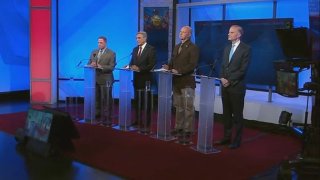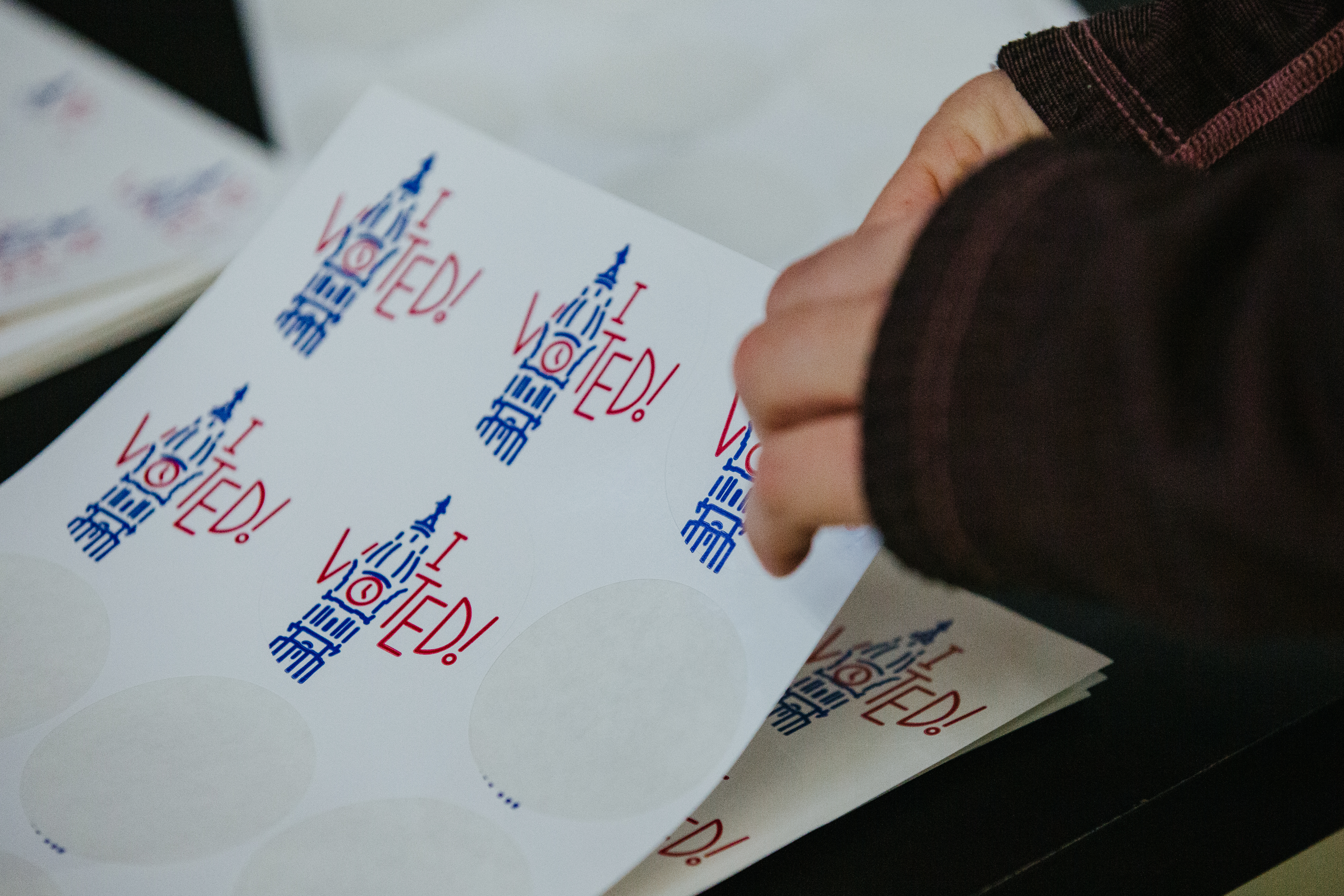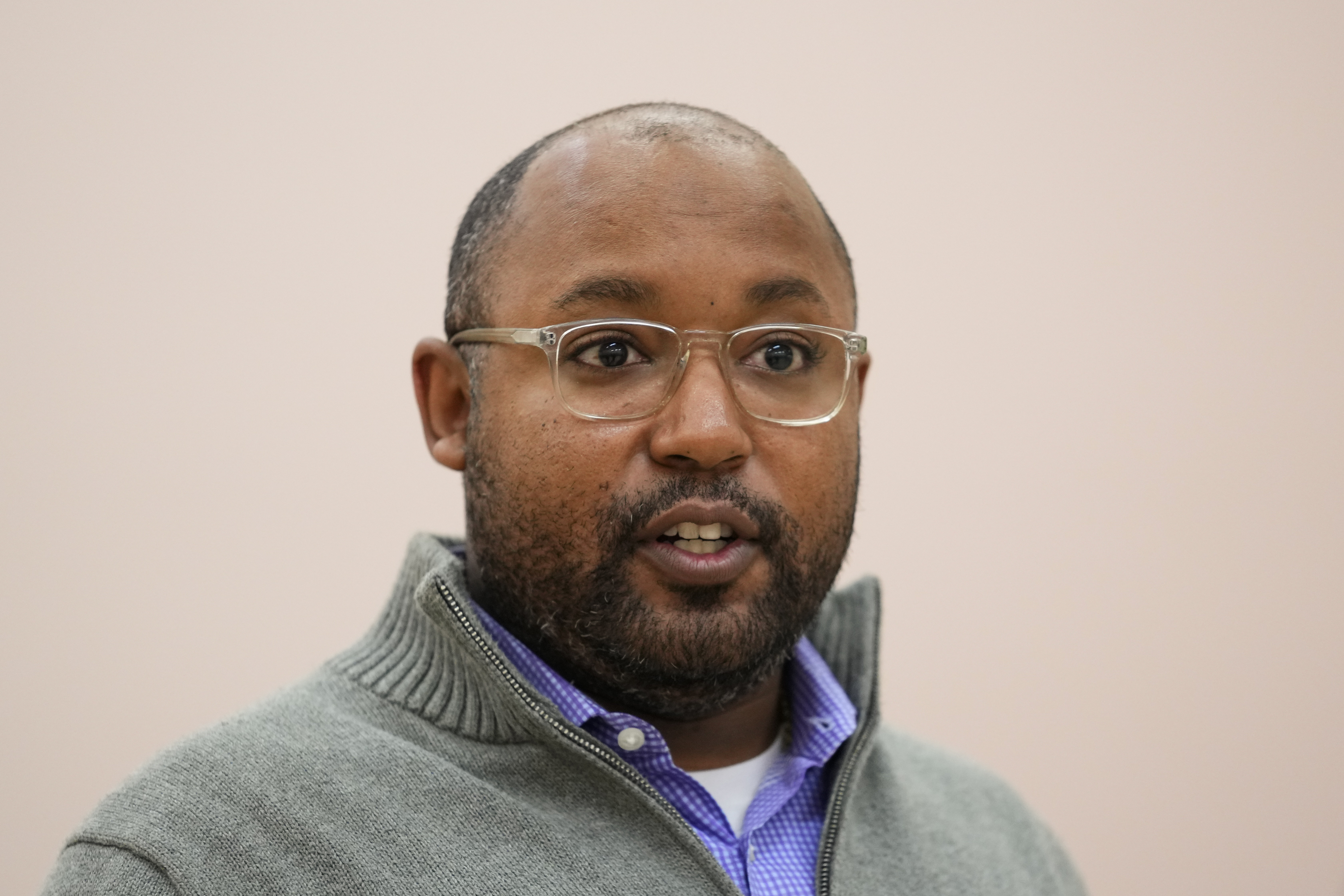
Leading candidates for the Republican nomination for Pennsylvania’s open governor's office made big promises in Wednesday night’s debate about how they’ll ramp up the economy and spend state dollars, as they clawed for an edge in a huge nine-person field.
Four of the nine candidates appeared at the live-televised prime-time debate, spending part of the hour in the studio of WHTM-TV in Harrisburg trying to establish an identity or an edge on a rival.
The four met the polling threshold set by the station’s parent company as they vie for the nomination to succeed the term-limited Gov. Tom Wolf, a Democrat. Five others didn’t meet the polling threshold.
The candidates were: Lou Barletta, the GOP’s nominee for U.S. Senate in 2018 and a former congressman known for his crusade against illegal immigration; state Sen. Doug Mastriano, a force in Pennsylvania’s right-wing politics who pushed to overturn 2020′s presidential election; Bill McSwain, a lawyer in private practice who was the U.S. attorney in Philadelphia under former President Donald Trump; and Dave White, who runs an $85 million-a-year plumbing and HVAC firm and is a former Delaware County councilman.
Get top local stories in Philly delivered to you every morning. Sign up for NBC Philadelphia's News Headlines newsletter.
In addition to questions on taxes and the economy, the candidates agreed that they would get rid of the state’s two-year-old no-excuse mail-in voting law, which some Republicans blame for Trump’s 2020 election loss in the presidential battleground state.
They also said they would sign “constitutional carry” legislation — scrapping the state’s requirement that gun owners get a permit from the county to carry a concealed firearm in public. And they all said they would restrict or even ban abortion, if allowed by the U.S. Supreme Court, differing only on possible exceptions. McSwain said he would maintain exceptions for rape, incest and the life of the mother, while the others would not.
Neither the state party nor Trump have endorsed in the race, leaving the field that much more wide open. Two-term state Attorney General Josh Shapiro does not face a challenger for the Democratic Party’s nomination.
Decision 2022
Coverage of the 2022 elections
But the huge field has stoked unease among some top Republicans that a toxic candidate could win with less than 30% of the vote in the May 17 primary election.
To that end, Mastriano was asked what he would tell voters concerned that he has “legal issues,” worries that stem from the subpoena issued to him by the congressional committee looking into the Jan. 6 insurrection.
“There are no legal issues,” Mastriano responded.
On spending, the candidates struggled to say — or didn’t say at all — how they would replace revenue if they cut the state's gas tax. They pledged to cut business taxes and regulations.
They also pledged to help bail out nursing homes, which have said they're having to close facilities because of inadequate Medicaid reimbursements, except for Mastriano.
Instead, he turned the question to the baseless accusation that the Wolf administration is guilty of “sending the sick back into the homes which have killed at least 16,000 of our elderly” during the pandemic.
Across the country, and in every state, recovering COVID-19 patients were accepted by nursing homes, more than 250,000 in the 12 months through March 1, 2021, according to federal data.
No investigation or report has thus far pointed to the policy as a cause of death or outbreak. Rather, research points to other factors — such as asymptomatic community spread — as determining factors in COVID-19 outbreaks in the homes.
On the economy, they all promised to usher in more natural gas drilling in the nation's No. 2 gas state.
“We will frack,” White said, using the shortened term for hydraulic fracturing, a critical method of unlocking oil and gas from rock formations. “We’ll get it going. That’ll bring additional revenue to our state and it’ll grow our economy. Great-paying, six-figure jobs, 50,000 to 60,000 of them, very quickly.”
However, the industry already describes drilling as strong and says it has access to the gas it needs. Rather, it lacks things that are difficult for a governor to deliver on, such as big interstate pipelines and big customers — like liquefied natural gas processing facilities — to use it.
They also vowed to turn around Pennsylvania's economy, despite the fact that it has for decades lagged most of the rest of the nation in its employment rate, population growth and the rate of job creation as its legacy industries shrank.
“We shouldn’t be towards the bottom,” McSwain said. “And it’s only going to change if we have a conservative outsider, not more politicians as governor.”
___
Follow Marc Levy on Twitter at twitter.com/timelywriter




